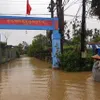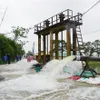PM stresses urgent need for keeping power supply, demand balanced

Pointing out a soaring power demand as a result of the socio-economic development and post-pandemic recovery, the Government leader said ministries, sectors, and agencies have yet to act drastically enough to carry out his official dispatch, issued on December 24 last year, on economical and efficient power use and power supply in 2022 and beyond.
He said in 2021 and the first quarter of 2022, electricity supply and demand have been guaranteed, but power shortages occurred in some places and at certain points of time. PM Chinh underlined the critical importance of keeping the power supply-demand balance in the time ahead, given complicated external factors and the economy’s demand.
He asked all-level authorities, sectors, and relevant agencies to improve their sense of responsibility, proactively take measures for ensuring the power supply with reasonable prices for economic and daily activities, and easing dependence on foreign electricity sources.
In the long run, it is necessary to boost sustainable energy development and power generation, step up power saving solutions, encourage domestic electricity production, facilitate innovation to achieve low-cost, safe, and effective power generation , and properly handle the relationship between input materials and power prices.
The PM also demanded authorities and businesses to continue a close watch on the market to make appropriate adjustments, work closely together to ensure effective power generation and supply, and overhaul mechanisms and policies on power, coal, and gas production to safeguard energy security. At the meeting, the Vietnam Electricity (EVN) group said power supply will be basically ensured for the southern and central regions from now to 2025.
Meanwhile, demand in the northern region, which accounts for nearly 50 percent of the country’s total, will rise faster than the national average. However, the new generation sources that are set to be operational each year during 2022 - 2025 will continually be lower than the growth in power demand, which may lead to electricity shortages during May - July, the peak period of hot weather and also the dry season - when hydropower plants’ capacity may decline, the firm added.





